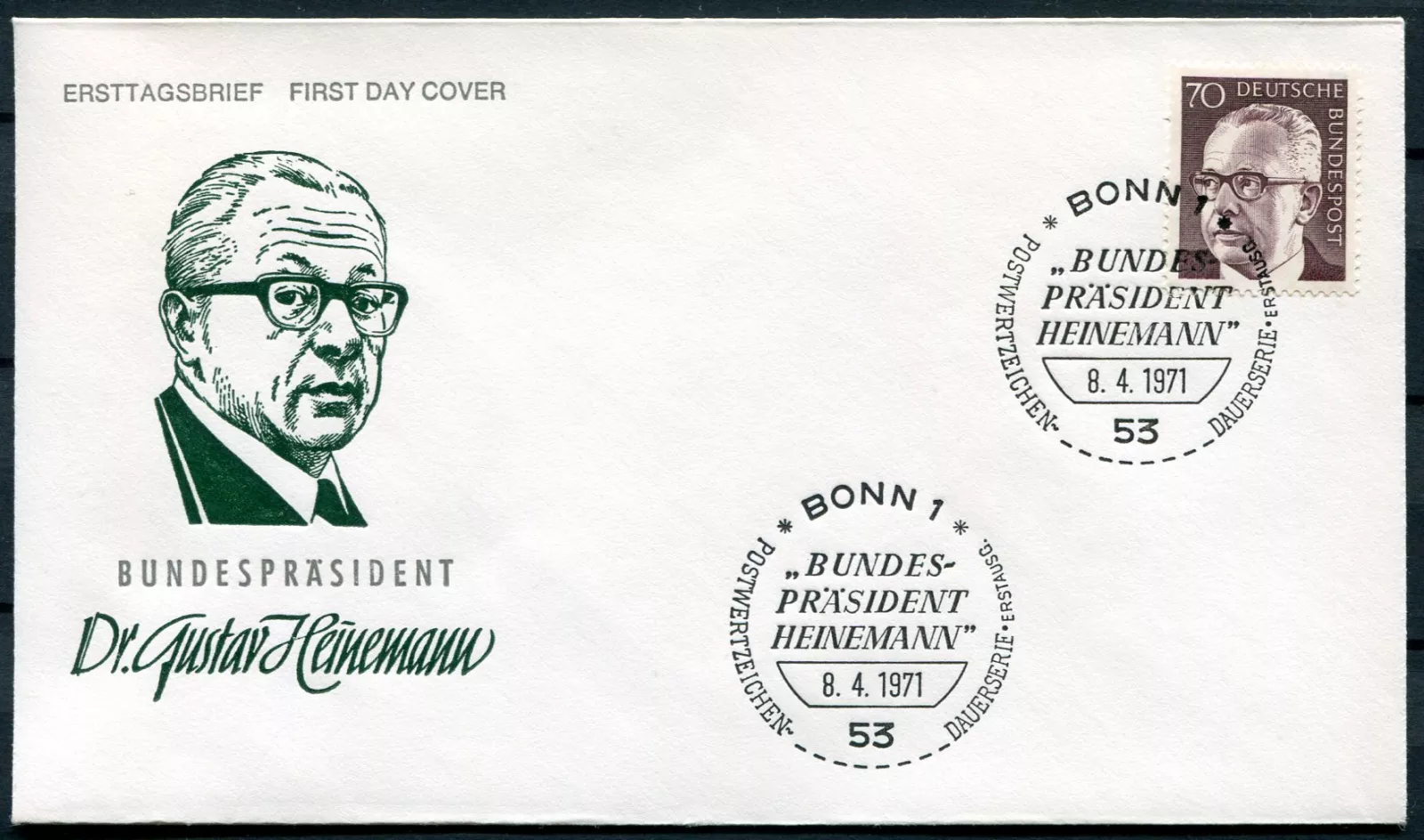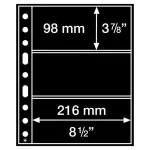- Home
- Philately: postage stamps
- Philately: stamps all over the world
- Europe
- German territories
- Germany - Germany
- FDC + Pam. envelopes
- FDC MiNr. 641 (8.4.1971) - Germany - Dr. H.C. Gustav Heinemann (1899-1976)
FDC MiNr. 641 (8.4.1971) - Germany - Dr. H.C. Gustav Heinemann (1899-1976)
FDC SRN

| Code: | SRN-FDC-641 |
| Producer: | Deutsche Bundespost |
| Price: | 0,87 EUR |
| Availability: | In Stock |
| Stock: | 1 Pcs |
| Year: | 1971 |
| Catalogue no. (MICHEL): | 641 |
| Cat. number (St. Gibbons): | 1543 |
| Cat. number (Yvert et Tellier): | 513 |
Dr. HC Gustav Heinemann (1899-1976)
Democrat and civil rights advocate
Gustav Walter Heinemann, born on 23 July 1899 in Schwelm, Germany, was one of the most prominent political figures in post-war Germany. His professional life included advocacy, politics, and activism, and he was best known as Germany's third federal president (1969-1974). Heinemann left a distinctive mark as a champion of democracy, human rights, and civil c
Early life and education
Heinemann studied law, economics and history at the universities of Münster, Marburg, Munich, Göttingen and Berlin. In 1922 he received his doctorate in political science and seven years later completed his doctorate in law. Already during his studies he was actively involved in democratic circles and supported the German Democracy
Fight against Nazism
During the Nazi era, Heinemann showed courage by becoming a member of the Bekennende Kirche (Confessing Church), which opposed Nazi church policies. This activity may have involved him in the resistance against the totalitarian regime.
Political career
After World War II, he helped found the Christian Democratic Union (CDU) in North Rhine-Westphalia. In 1949, he became the first Federal Minister of the Interior in Konrad Adenauer's government. His strong moral principles, however, were responsible for his resignation in 1950, when he disagreed with a plan to rearm Germany.
Later he founded the Gesamtdeutsche Volkspartei (All-German People's Party), which supported German reunification and neutrality. After its failure, he joined the Social Democratic Party of Germany (SPD), for which he was appointed joint minister of justice in 1966
presidential term
In 1969, Gustav Heinemann was elected the third Federal President of the Federal Republic of Germany, the first president elected on the SPD ticket. His presidency was marked by support for Chancellor Willy Brandt's new Eastern policy, which aimed to improve relations with Eastern Europe. Heinemann also campaigned for the democratization of society and the empowerment of citizens
Personal life
Gustav Heinemann was married to Hilda Ordemann from 1926, with whom he had four children. His granddaughter Christina later married Johannes Rau, another SPD politician and later federal
Reference and Death
Heinemann died on 7 July 1976 in Essen. His legacy lives on as a symbol of commitment to democracy and civil liberties. In his time, he was a foreign voice of conscience and humanism, which earned him respect not only in Germany, but also.
Gustav Heinemann remains an example of a politician who was prepared to sacrifice his personal career for higher moral principles. He showed with his life that politics can be a way to defend human dignity and justice.
Frequently Bought Together - FDC MiNr. 641 (8.4.1971) - Germany - Dr. H.C. Gustav Heinemann (1899-1976)

| Price: | 23,81 |

| Price: | 23,81 |

| Price: | 23,81 |
From the Same Category - FDC MiNr. 641 (8.4.1971) - Germany - Dr. H.C. Gustav Heinemann (1899-1976)
FDC SRN In 1972, the 21st International Paraplegic Games were held in Heidelberg, Germany, and became a significant moment in the history of Paralympic sport. This event, which was a precursor to the modern Paralympic Games, attracted athletes from ...
FDC SRN Kurt Schumacher (1895-1952) was a German Social Democrat politician who played a key role in the renewal of German politics after World War II. He was a staunch advocate of democracy and social justice, as evidenced by his long struggle ...
FDC SRN Memorandum for the Heinrich von Stephan Museum Heinrich von Stephan (1831-1897) was an important German postal reformer and founder of the Universal Postal Union. His work had a major influence on the modernisation of the postal system not ...

